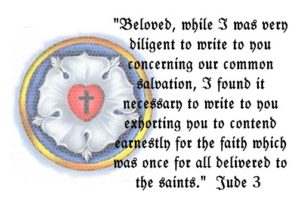 What are the main differences between the LCMS and the ELCA? Why aren’t we in altar and pulpit fellowship? Is ‘Lutheran’ still Lutheran anymore? More than German vs. Norwegian: getting beyond potlucks, bratwurst, lefse to the real substance of things…
What are the main differences between the LCMS and the ELCA? Why aren’t we in altar and pulpit fellowship? Is ‘Lutheran’ still Lutheran anymore? More than German vs. Norwegian: getting beyond potlucks, bratwurst, lefse to the real substance of things…
We don’t desire to be confrontational, but compassionate in observing the very significant differences between what the ELCA and the LCMS confess and practice. Many might not realize until something radical happens how far they have drifted from their biblical heritage. We delve here into what may be a sensitive subject that can cross family lines, friendships, and childhood memories. But it is still an important question for committed Lutherans. Despite what many midwesterners have learned about Lutheranism from Garrison Keillor’s news from Lake Wobegon, there are increasingly divergent and important differences between the main Lutheran church bodies in North America. At Grace we have welcomed many who have come from ELCA (or ALC/LCA predecessor) background through some basic review of teachings as they had become gradually aware of crucial deviations from biblical Christianity and confessional Lutheranism, despite the ELCA still using the name “Lutheran” for some reason.
The Evangelical Lutheran Church in America and The Lutheran Church-Missouri Synod continue to part ways when it comes to teaching (doctrine) and practice. Many of these differences have deep roots, not in culture or ethnicity, but in how the Bible is understood. Many of the differences began when some decades ago there began to be a denial of the inspiration, inerrancy, and authority of the Bible was denied or watered-down amongst many Lutherans. When the ELCA merger took place this began to spread throughout other areas of church teaching and life – the acceptance and authority of the Lutheran Confessions (the Book of Concord of 1580), fellowship declarations with non-Lutheran churches, the ordination of women to the pastoral office and women taking up the duties of pastors, the denial of the order of creation, the denial of creation over against evolution, and more recently the acceptance of homosexuals (male and female) into the pastoral office, the provision of abortion within the ELCA church worker benefit plan, and the LWF agreement with the Roman Catholic Church on the doctrine of justification. Our nostalgia, if we should even call it that, should be for sound Lutheran teaching and not simply our ethnic background or our memories of church buildings or food. The marks of the Church rightly preserved (Word and Sacraments) in the context of orthodox teaching and practice are important for our faith.
First off, what we are not saying:
- We do not believe only LCMS Lutherans are going to heaven. (We’ve never taught that.)
- We do not believe the LCMS is perfect in carrying out its teaching and practice. We have areas where we need to repent and do better.
A couple points we are making:
- While the name “Lutheran” isn’t contained in the Bible, our teachings are found in the Bible, and find their source from Scripture without reservation.
- We believe truth matters and that there is objective truth. We also believe that false teaching is harmful to the church and harmful to individuals. We believe biblical doctrine is an indivisible unity (or body) of belief, rather than compartmentalized unrelated doctrines that can be taken or left behind like food offerings on a buffet.
- We also believe many Lutherans are not fully aware of what genuine Lutheranism teaches and practices. For various reasons – minimal instruction, forgetfulness, poor clergy study habits, incursions of false teaching, apathy, or solely judging by one’s local circumstances and autobiography, our understanding has not gotten deeper. We have need to go back to the source of teaching in Scripture and to those clear, reliable secondary authorities we have in the Lutheran Confessions (The Book of Concord of 1580), and to study our own history. If we do this we will discover that we have lost a great deal of our own heritage through various influences but also that we have a great deal of treasures in our “grandmother’s attic” so to speak. Our heritage as Lutherans is both evangelical (gospel centered) and catholic (universal, whole, ancient).
Like shooting an arrow at a target over a long distance, the longer deviations from sound teaching persist the more damaging, exaggerated, and worse they will get. Unchecked errors do not generally stay static but metastasize. (Remember the words of Jesus about the leaven of the Pharisees and the Sadducees – a little false teaching can radically transform the substance of things in time). Please prayerfully consider these important differences between the Missouri Synod and the ELCA (what came from a merger of the ALC, LCA, and AELC).
Differences Between the ELCA and the LCMS by former LCMS President, Rev. Dr. Alvin Barry
The Ordination of Women to the Pastoral Office by former LCMS President, Rev. Dr. Alvin Barry
LCMS Frequently Asked Questions on Lutheran Denominations
A Comparison of Views Between the ELCA vs. the LCMS
The Inspiration and Inerrancy of Holy Scripture as a foundational issue
Rev. Dr. John T. Pless – “Ordination of Women and Ecclesial Endorsement of Homosexuality” (PDF)
We certainly acknowledge that there will be no outwardly perfect church body or synod on this side of heaven. We do not believe the Book of Concord merely represents “what we as Lutherans believe” nor what Lutherans at one time believed. We believe them to be a faithful articulation and confession of belief and practice which is both entirely evangelical and catholic in the best and original senses of both terms. In the sound confession of Christ the Holy Spirit, calls, gathers, enlightens and sanctifies the whole Christian Church on earth and keeps her with Jesus Christ in the one true faith. No additions of man can improve upon the Word of God or make it more effective.
Concern for sound doctrine is not merely a matter of being “conservative” or “liberal” (as if doctrine is on a sliding scale) or about the purity of a political ideology. It is about truth versus falsehood, orthodoxy vs. heterodoxy, what creates and nurtures faith versus what destroys false and grounds it in a false object. It is about nutritional food for the soul vs. no nutrition or even poison. Again, Jesus warned about the leaven (meaning: teaching) of the Scribes and Pharisees? How little leaven (yeast) can radically change a lump of dough? Even the Great Commission instructs us to teach “all things” Jesus has commanded. Therefore we cannot pit doctrine and missions (or evangelism) against one another. 2 Peter 1 reminds us that no prophecy of Scripture is of anyone’s private interpretation.
Even though the Church is scattered throughout the whole world, it is One in Christ Jesus. It exists where the Word of God is taught in truth and purity and where the Sacraments are administered according to Christ’s institution. Confessional Lutheranism understands itself as historic Christian faith and life, nothing less, nothing more. As the centuries of church history have moved along, various questions have arisen. The Lutheran Confessions are a set of documents that set forth Biblical answers to those questions. This is why we seek to hold course rather go the route of generic protestantism as many have unfortunately gone. There are many others, too, who seek to hold to the faith that was once for all delivered to the saints.
